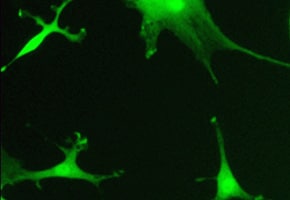Can Glaucoma Be Cured?
We hope to one day restore vision lost from glaucoma, but that can't presently be done.

Existing glaucoma treatments slow the process for most patients so no meaningful vision loss occurs in their lifetime. There are, however, several potential avenues to a cure.
Innovative Drug Delivery and Neuroprotection
If glaucoma medicine could be given only once or twice per year, it would be more effective and patients would no longer need to take eye drops every day. Several agents could be placed on or in the eye, including long-lasting drugs that lower eye pressure, or modified virus particles that put new genes inside the eye cells to slow glaucoma damage.
Researchers have already successfully tested glaucoma gene therapy in laboratory models. Gene therapy is one of several approaches, called neuroprotection, to preserve existing vision. There are several potential neuroprotective drugs, but no definite benefit has been shown in human trials yet.
Optic Nerve Cell Regeneration
For those who have very significant vision loss from glaucoma, the hope is that we will one day restore vision lost due to death of retinal ganglion cells. These nerve cells do not normally regrow, so to improve vision, we must put back nerve cells where previous ones were, link them up with the other retinal nerve cells they normally get information from, and grow a fiber up to the brain’s next vision relay station. Connections need to be made that produce useful vision, without messing up existing connections for the vision that hasn’t already been lost.
Initial Steps
25 years ago, scientists thought it would be impossible ever to restore vision in glaucoma. Since then researchers have accomplished some initial steps. We can get new nerve cells from a patient’s own eye. Once we get some of these progenitor cells out (surgically) safely, we can grow thousands of new ones from them (Figure 1). Since they are the patient’s own cells, they won’t be rejected.

Figure 1: New progenitor cells produced from existing cells in the eye growing in culture dish. These may someday become replacement cells needed to restore vision lost in glaucoma.
Progenitor cells from the eye and from bone marrow have been tested as replacements in the eye, and have lived there for brief periods.
The next steps are to connect them to the existing retinal cells and grow a fiber up to the brain. We believe this will involve providing a path for the new fibers using a piece of nerve to connect the eye and brain.
Article by Harry A. Quigley, MD.
First posted on September 1, 2011; Last reviewed March 24, 2022.

Harry A. Quigley, MD.
Dr. Quigley is the A. Edward Maumenee Professor and Director of the Glaucoma Center of Excellence at the Wilmer Eye Institute at Johns Hopkins, in Baltimore, Maryland. He has participated in glaucoma studies worldwide and published over 4,500 peer-reviewed articles.